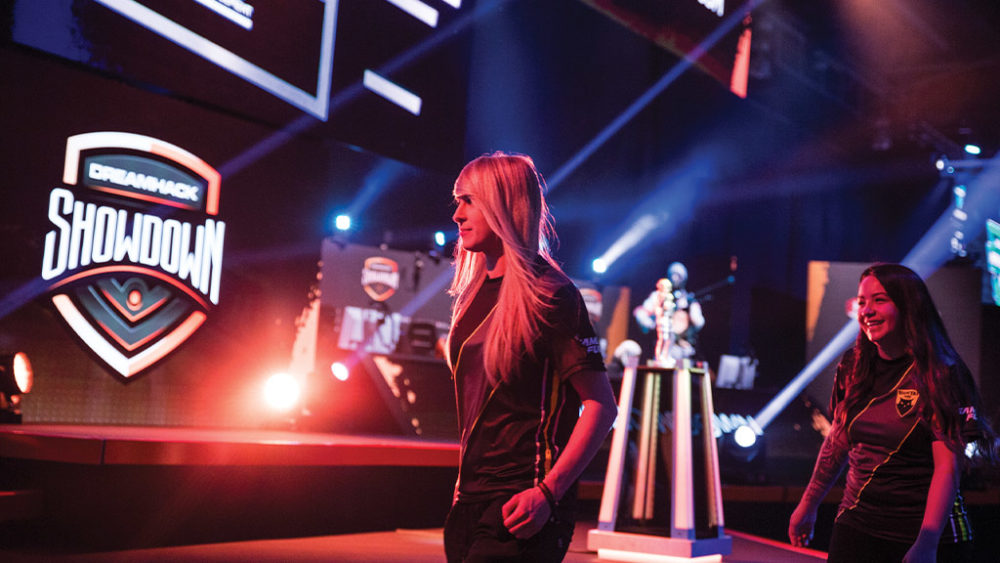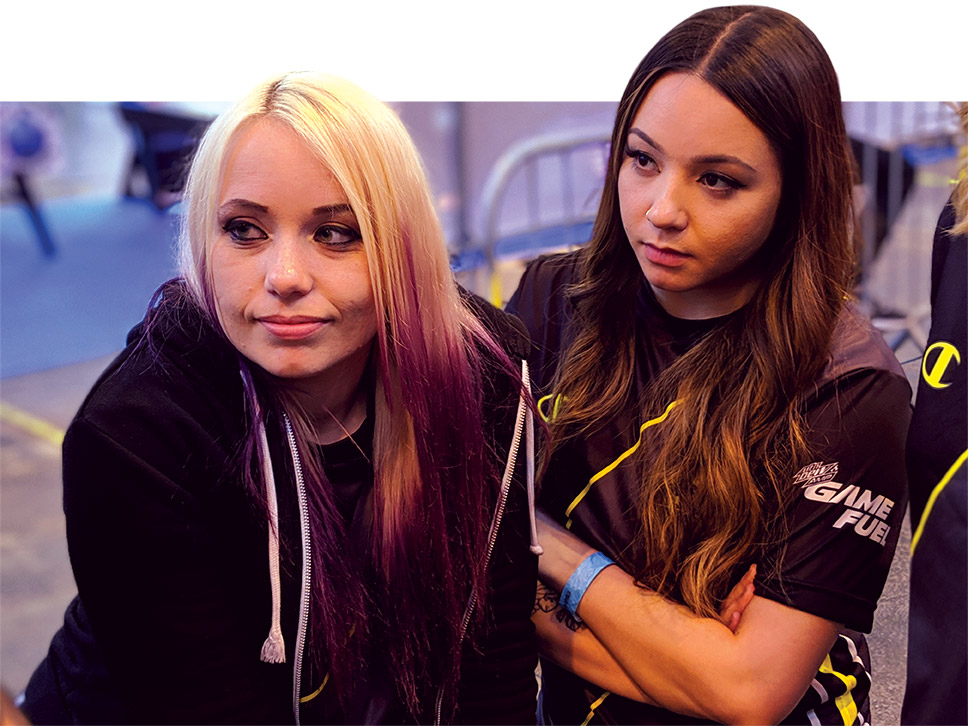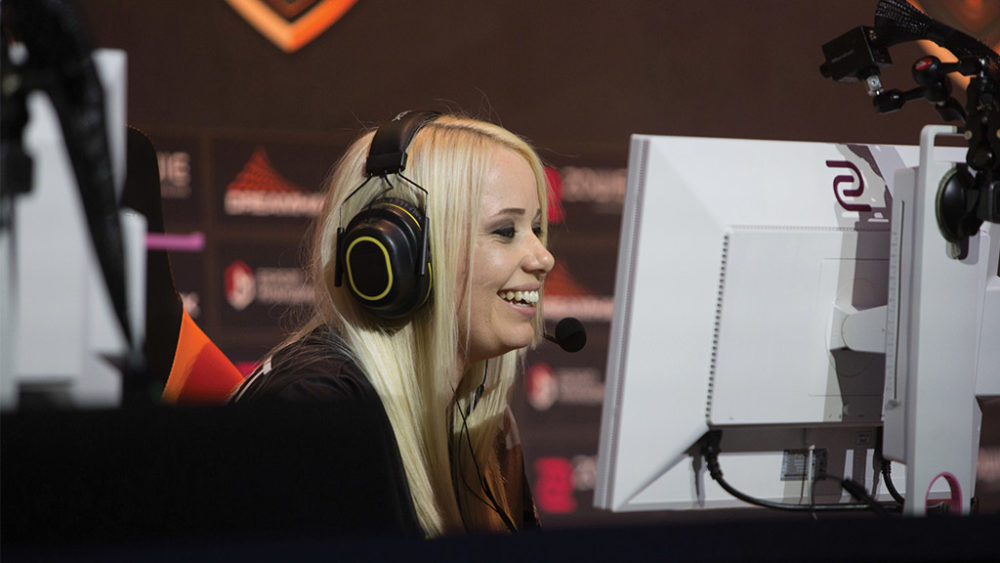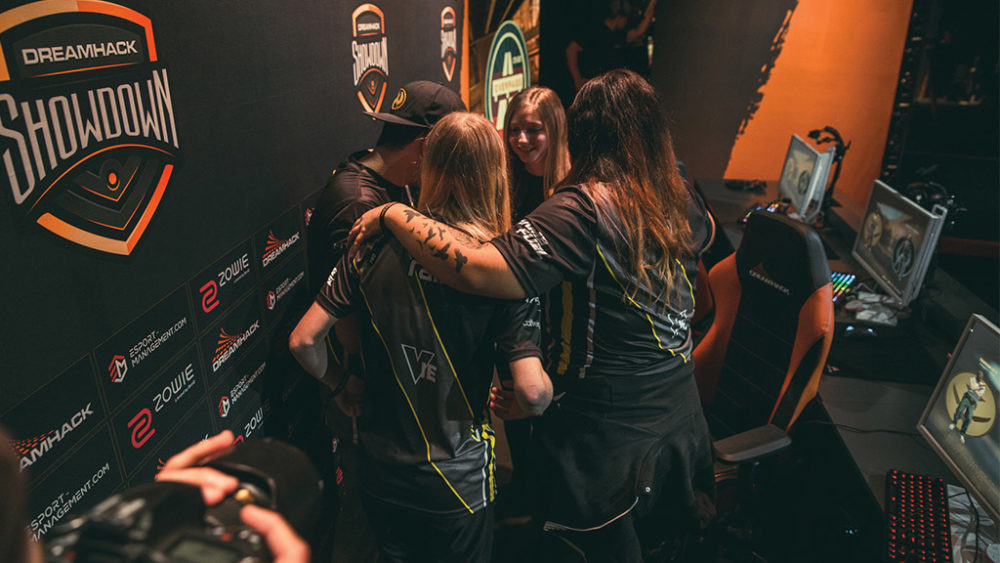
The first thing that Dignitas FE’s Vice President of Marketing Heather Garozzo — gamertag sapphiRe — warned me about as we walked toward the esports team’s training center is that the team was a little bummed out after the results of their most recent tournament. This caught me slightly off guard, given that the tournament was the 2020 Girlgamer E-Sports Festival in Dubai and Dignitas FE had finished in second place. When I pointed this out, she laughed. “I know,” she said, “but they won the last two.”
Women have been gamers as long as there have been games to game — the Entertainment Software Association’s 2019 survey of gaming demographics reported that women made up 46% of all gamers in the U.S. But those numbers lag significantly in the world of professional gaming, where women make up 30% of viewers, but only 5% of competitors — with some major leagues lacking women completely. Esports presents an incredible opportunity to create a 21st century sport — it’s international, accessible, and intersectional, without barriers based on gender or physical ability. But when the dismissal, belittlement, and harassment of women has been a brutal constant throughout the history of gaming, it’s important to ask: As we look toward esports’ bright future, how do we make sure women aren’t left behind?
And that was why I found myself in Los Angeles this past February. Well, that and the taco game in LA is just unstoppable. But mainly the article.
Tacos aside, in the last decade, LA has become the epicenter of competitive gaming in the U.S. Many of the largest and most competitive North American gaming organizations have permanent offices in LA, and the city has multiple dedicated gaming arenas, including LCS Studios, which is home to the North American division of League of Legends, the world’s most popular esport. The future of American esports runs through LA, and so do the people who will shape said future. People like Amanda Smith, Emmalee Garrido, Kiara Makua, and Melisa Mundorff — the four players who currently make up Dignitas FE.
Dignitas FE is a well-established team, and many of its members’ careers predate the team itself. Makua — gamertag Milk — has been playing Counter-Strike since 2009; Smith, who goes by Rain, since 2006; Garrido, the team founder and captain who plays as EMUHLEET, has been fragging terrorists since 2004; and when it’s Garozzo’s turn around the circle, the esports Hall of Fame player hesitates a moment: “It dates me,” she mutters, “but 1999.”
The original iteration of the team came together in 2014, when Garrido decided to assemble a squad to compete in the women’s Counter-Strike: Global Offensive tournament at the Electronic Sports World Cup (ESWC) in Paris, France. Her reasoning?
“Of course I wanted to go to France,” she says, laughing, “but I wanted to show that, yeah, I am one of the best — if not the best — female gamers in the world. So that was kind of my chance to prove it.”

She reached out to friends she had met through her time playing — including Garozzo, who she met just three weeks before the tournament — and the newly minted Team Karma took second place at ESWC 2014. Though some teammates have come and gone, they’ve been playing together ever since.
“And now, I’m realizing my team is moreso my family, more than just my teammates,” Garrido says, “and that’s something I didn’t know would happen when I first created the team.”
And it’s a good thing that Team Karma got along so well, because its first couple years of existence were marked by close quarters and deep personal commitment.
“First tournament, we had six people in one hotel room,” Smith recalls. “We all shared one bathroom with five [other] girls. Oh, that was rough. But we made it work because we wanted it so bad.”
“We were one of the only teams that were going to events with no financial backing and no sponsors,” Garrido clarified. “For two, almost three years, we were paying out of pocket. But that just shows how much time and money we wanted to invest in proving ourselves to the world.”
Those years of perseverance proved worthwhile in 2017, when the team was acquired by Dignitas, a longtime esports organization that itself had been acquired by the National Basketball Association’s Philadelphia 76ers in 2016. The support of Dignitas and the Sixers — and the deep bench of support staff that came with them — have been huge boons for Dignitas FE. All three players I talked to extolled the virtues of being able to meet with the Sixers’ sports psychologist. Garozzo shouted out the access to the organization’s PR teams, which has granted FE visibility and outreach not often available to women’s esports teams. But Garrido points to a different, larger benefit of working under the Dignitas — and the Sixers — umbrella.
“The whole esports community is still learning, where should there be places structured? And I’m noticing that we’re being treated like these traditional athletes,” she says. “These are things that people didn’t know a few years ago would help esports teams excel.”
It’s an important point to consider. In its early years, esports was often a wild west — even as its popularity grew, infrastructure like media training, organizational mental health support, and safety measures didn’t match the growth rate. On one hand, this could be exciting: It heightened that closeness, that sense that these pros weren’t that far removed from us. On the other hand, it put gamers at risk: It supercharged exposure while limiting accountability led to increased opportunity for online and in-person harassment, and female-identifying gamers — who had always been popular targets of the worst tendencies of the large toxic subsection of the gaming community — bore the brunt of it.
The support that Dignitas provides for the team and its positive effects raises an important question: Could making that much-needed structure more widely available provide safety throughout the gaming community — and in turn, make competitive gaming a more welcoming place for women?
One person who thinks the answer is “yes” is Nicole LaPointe Jameson, CEO of Evil Geniuses (EG), a 20-year-old gaming organization with teams across multiple games. Jameson, who after one year into her tenure as EG’s CEO has already established a deep and measured understanding of the history and future of gaming, is quick to hop on the point.
“Eight years ago — and I know I’m going to make people grumpy — I would describe it as more grassroots,” she recalls. “Funding wasn’t readily available. It wasn’t a comfortable or well-established or low-risk lifestyle, and it was generally not understood. It is not an inclusive or well-structured space that has checks and balances and provisions to accommodate [anyone other than] the predominant individuals, which at the time [were] males and young males. So part of it was just how the industry is structured … it self-selected out females from participating.”
Now, though, as the structure has fortified, the gates have begun to crack open as well. “Workplace cohesion and inclusivity is better thought about and structured,” Jameson points out. “Pay is more stable and career paths are more demonstrated. So people from all different walks of life feel more comfortable entering the space.”
But then the next big question arises: Once you make the space comfortable for women, how do you convince them to come inside? Remember that 46% statistic from earlier? There’s an important caveat: While a large percentage of women play games, a very small amount — only about 6% — of women would call themselves “gamers,” compared to 15% of men.

It’s not surprising. Companies have always marketed games that have competitive scenes — Call of Duty, Counter-Strike, League of Legends, NBA 2K — more heavily toward men than women. For that work to be undone, it requires information at an early stage, and that requires education. Under Jameson’s leadership, Evil Geniuses has set out to do just that.
“Kids will go to elementary schools and know ‘OK, firefighters exist, doctors exist, teachers exist,’” she says. “But not too long ago, esports wasn’t something that most people would have in their vocabulary. So, we are working really hard to roll out education at an earlier age in a positive way. Because the more people understand and are educated on, the more legitimacy and opportunity in the space, the better it is for everyone.”
The women of Dignitas FE have been working hard in this area as well. For the past several years, members of the team have attended an esports welcome week event for new students at the University of California, Irvine; and they run workshops for women interested in gaming. “A lot of them don’t play Counter-Strike, but that’s OK,” Garozzo says. “They’re just looking for female role models to look up to, and that’s something [that’s] incredibly important to us.”
Opening those doors doesn’t always have to be about education — it can be something as straightforward as a strong sign that women are welcome in the gaming space. Tricia Sugita, the CEO of gaming organization FlyQuest, was the architect behind FlyQuest’s women’s clothing line. When the line debuted in 2019, it was the first clothing line for women in esports. For her, however, it was important to make sure the message in the marketing was clear.
“When our PR person put it together, I ripped it apart,” she recalls. “It was such from a male point of view. It was all about ‘We finally have it! It’s about time!’ And I was like, ‘Yo, we don’t speak for all women.’ This was about getting women more choices. I saw a hole where all these options don’t exist, so I just wanted to give them opportunities to choose what they want.”
Sugita’s career is breathtaking in its expanse and prowess. A top-ranked competitive Starcraft 2 player, she transitioned to hosting and commentating on Starcraft before moving into management. Along each of those steps, she was often one of few women — if not the only one — in her field. But she’s quick to point out that she doesn’t think of things that way.
“I have my own standard for myself,” she says. “I see myself as just a CEO. Just me. Just a person. I understand that other people like me may feel more comfortable with the only female this or that. I think both can exist. I don’t think we have to be so small minded.”
It’s an interesting line that women in esports are asked to walk. They are made standard bearers not necessarily because they want to be, but because when there are painfully few to choose from, you have little choice.
“I was sort of like, ‘oh, girls, I don’t think I’ll get along with them,’” says Makua, Dignitas FE’s newest member. “I always kind of shifted away from playing on a girl team.”
And that’s understandable. The goal for these women was never to be the best female gamer — it was to be the best gamer, period. The majority of the year, Dignitas FE plays against all-male teams.
“We do the women’s events because they promote female participation in esports,” Garozzo says, “but still, in terms of other events, we want those to be gender agnostic. We want to and can compete with the males and we want to be the best Counter-Strike: Global Offensive team in the world, regardless of our gender.”

“We’d like to be much more purposeful with gender and diversity initiatives because we’d like to help be a driving force in bringing the space to where we believe it should be,” Jameson says, “both for its own perpetuity and success, as well as showcasing the best of all gamers. I think that is a really, really good starting step for both showcasing and breaking all presuppositions around ‘females could not play at this pro level’ or ‘they don’t belong or cannot hold their own in this space.’”
Sugita worked along the same lines for FlyQuest. “My goal was to be much more inclusive,” she says. “I want to hit not just the hardcore fans, but the fans that are like ‘hey my boyfriend likes sports or league, so I watch it with him, but I don’t really have a reason for it.’ I wanted my girlfriends [who don’t play games at all] to like my team. I’m thinking of my niece.”
Women in esports are no longer an oddity or a singularity. They’re in the scene. They’re in the front offices. They’re behind the hosting desks and designing the jerseys. The groundwork is there, and it is continuing to grow. The next step, then, is how to normalize it; how to take one of the rarest unicorns in sports — a sport that still has room to grow, that has no skill barrier across genders, that has no reason for sexism to be inherent in its DNA — and code equality into its progress. It’s a step that people like Jameson, like Sugita, like the women of Dignitas, are making great strides toward, and that we, as fans, consumers, and gamers, can help to bring over the finish line.
For Garrido, it’s the chance to fill a gap for those who come after her. “I’m just thinking of me as a little girl going shopping and seeing a female gamer poster at a normal store, and saying ‘wow, that’s just like me.’ So I’m just waiting for the chance to do that.”
This article was originally published in Issue No. 7 of the Pop Insider. Click here to read the full issue!
